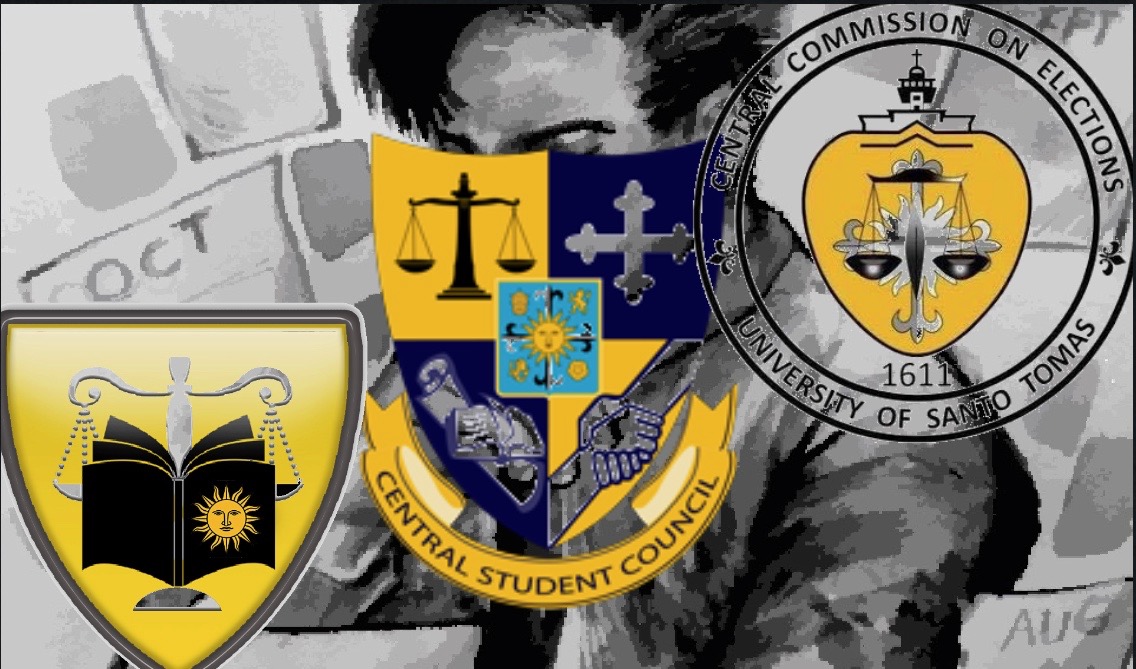
Only six candidates are vying for spots in this year’s student polls, of which three are running unopposed. There are no candidates for treasurer and auditor. Are Thomasians no longer interested in student politics?
TWO CHARACTERISTICS define the dwindling political interest among Thomasians in this year’s Central Student Council (CSC) Executive Board elections: the lowest number of candidates in recent years and the lack of candidates for treasurer and auditor.
“In a way, it is quite alarming….For the past number of years, I’ve been [seeing the] dwindling interest of students in the political race, especially in the CSC,” Asst. Prof. Froilan Calilung, who teaches political science in the University, told the Varsitarian.
CSC Secretary Krizia Milleny Bricio of the Faculty of Arts and Letters is the only candidate for the presidency in the upcoming student polls.
Gerald de la Cruz and Arnet Paguirigan, also of the Faculty of Arts and Letters, are likewise running unopposed for the positions of vice president and secretary, respectively.
Three students are vying for the public relations officer (PRO) position: outgoing Institute of Information and Computing Sciences Student Council PRO Carl Jeric Mataga, former College of Commerce Student Council vice president Jerome Espinas and UST Pedagogue PRO Gabriele de Lara.
The shrinking political interest this year could be attributed to the Covid-19 pandemic and the lack of face-to-face classes, Calilung said. But enthusiasm for student politics had been dwindling even before the pandemic hit, he said.
Anthony Divinagracia, a political science lecturer, said the lack of candidates could be “seasonal” and “circumstantial.”
“Kumbaga ang mindset ng mga bata ngayon…we don’t have the luxury of time to engage in student politics and we would like to mind our own academic business,” Divinagracia told the Varsitarian.
“Makikita mo naman e, may say pa nga sila (Thomasians) sa national politics. Bakit wala sa UST politics? Kung tutuusin it is a microcosm of it.”
Divinagracia said the lack of students wanting to take responsibility did not necessarily mean that Thomasians were politically disinterested.
But it was “highly irregular” that students gunning for higher positions were running unopposed, Divinagracia said.
“Suppose you managed to get a certain number of votes to get elected, the issue is, paano ka mamumuno kung ang tingin ng pinamumunuan mo, hindi ganoon kaimportante yung eleksyon na ‘yon? One way of showing importance to that election is by fielding in other candidates kasi kahit naman sino pwede tumakbo,” he added.
Only the post of public relations officer in this year’s polls is being contested by more than one candidate.
‘Presence not felt’
Calilung said he was concerned over the lack of students who want to serve in the student council, because it could be proof that the CSC was “ not as evident or visible or easily felt.”
“I don’t want to say that Thomasians, in general, are not that politically aware, or there is a culture of indifference—hindi doon nagkukulang. Siguro over the past few years, nakukulangan ‘yong mga estudyante sa presensiya ng CSC,” he said.
Divinagracia said: “The students are not seeing [the CSC] as relevant as before. Hindi issue na puro independent [ang candidates] pag mababa ang voter turnout. ‘Pag mababa ‘yan, ang ibig sabihin no’n, hindi interesado ang mga students kahit karapatan nila ‘yon dahil hindi nila nakikita na may effect kayo sa kanila.”
The voter turnout for the University-wide elections in 2019 was 55.54 percent, or 21,122 out of 38,032 students, significantly lower than 2018’s 68.72 percent or 26,148 out of 38,045 students.
Divinagracia said the UST Central Commission on Elections (Comelec) should consider being more lenient with the requirements for candidates to boost student participation in campus politics.
“Baka masyadong stringent ‘yung rules ng (Comelec) and hindi nakakatakbo ‘yung ilan dahil lagi silang nadidisqualify,” he said.
Independent trend
In 2020, the Comelec did not approve any political parties. This year, no political party filed for re-accreditation and registration.
In effect, all candidates vying for CSC spots this year are running independently.
Outgoing CSC President Robert Gonzales said he did not want to continue the “dirty politics” of political parties during his early years in the University, so he ran as an independent candidate in the past two student elections.
“When I ran for council, one thing that I wanted to abolish was the dirty politics which was evident during my first year in college and… even before I entered UST,” he told the Varsitarian.
Calilung said having a strong political party system could create a pool of candidates willing to serve the student body.
Having political parties would also encourage political discourse, which Divinagracia, a former Varsitarian editor in chief, said was healthy for student politics in UST.
“From debates, nagkakaroon ng discourse which is healthy for any political exercise. Kung unopposed ka, sino kapalitan mo ng idea?” he said.
This year’s student polls will be conducted via the Zoom virtual meeting platform and an electronic voting system (EVoSys), from May 10 to 15, excluding May 13.

0 Comments